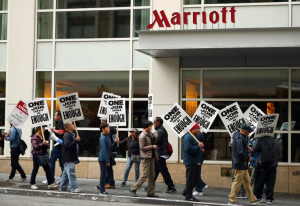 Marriott International is the biggest hotel chain in the world, with around 6,700 franchised hotels operating under 30 brand names in 130 countries. In 2017 Marriott raked in net profits of $1.37bn. These glittering rewards are not however reflected in the pay and working conditions of the housekeepers, catering workers, dishwashers, janitors, doormen and bar staff who keep the hotels running. Workloads are excessive, with staff running around trying to deep-clean rooms in double-quick time. Meanwhile the job-security of in-house staff is undermined by outsourcing: for example, the conracting out of food preparation.
Marriott International is the biggest hotel chain in the world, with around 6,700 franchised hotels operating under 30 brand names in 130 countries. In 2017 Marriott raked in net profits of $1.37bn. These glittering rewards are not however reflected in the pay and working conditions of the housekeepers, catering workers, dishwashers, janitors, doormen and bar staff who keep the hotels running. Workloads are excessive, with staff running around trying to deep-clean rooms in double-quick time. Meanwhile the job-security of in-house staff is undermined by outsourcing: for example, the conracting out of food preparation.
However, whilst Marriott International profits from the giant web of exploitation it has spun, workers are now learning to use that same web to spread the example of resistance. So it was that in October, with the then current 5-year contract coming to an end, and weeks of demonstrations not having led to any concessions to the concerns of staff in the proposed new contracts, the cooks, the concierges, the housekeepers and all the other low-paid and semi-invisible staff on whose labour the Marriott empire relies upped and walked out on the job. The walk-out spread to 23 Marriott-operated hotels in Boston, Detroit, San Francisco, Oakland, San Diego, Honolulu and Lahaina, Maui.
As many as 7,700 workers joined the walk-out. One disgruntled guest complained to the New York Times that she was woken at seven every morning by the noise of megaphones on the picket line, with workers telling guests: “Don’t check in, you need to check out”! (see (see: Karen Schwartz, ‘What you need to know about the strike against Marriott Hotels, New York Times, 31 October 2018).
The dispute was settled with Marriott Hotels making some concessions, including a wage rise of over 15%, as well as the agreement to provide staff who enter guests’ rooms with panic buttons in case they face assault, and an agreement, previously always refused, to blacklist guests against whom complaints of sexual harassment of staff have been made. The strikers were reportedly jubilant at what they had achieved and went back to work on 5 December.
Comments are closed, but trackbacks and pingbacks are open.